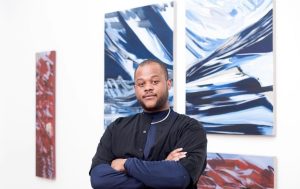Alexander Richard Wilson

Alexander Richard Wilson
b. 1993, Saint Louis, MO
Lives and works in Denver, CO
Alexander Richard Wilson is a queer, African American artist working to render the condition of the contemporary american landscape in the midst of the turmoil of climate change. Born (1993) and raised in St. Louis Missouri among five siblings, Alexander was influenced by the St. Louis Area’s architectural legacy. Built as a lover of the sensation of being a part of a whole. Alexander seeks to articulate landscape paintings that speak to the American environments precarious present we face together. After attending the school of the art institute of Chicago (2017), Alexander worked in the city of Chicago. Upon moving to Lakewood, Colorado in the summer of 2020, and
meeting the conditions present in the mountain west, they started painting landscapes that directly called out present extreme weather conditions, and large mountain fires. Their paintings speak to the striking severity of the events unfolding in the mountain west, and a sensibility regarding line and form, formed in the crucible of Chicago’s towering canyons. Alexander has shown these works at Friend of a Friend Gallery Denver,
the Paul R. Jones Collection of American Art at The University of Alabama, the New York Studio School, Northwestern University’s O Connor art Gallery, and the Birmingham Museum of Art in Alabama.
As a black queer artist, I am driven to explore the intersectionality of identity, societal structures, and the pressing issues that shape our world. Through my oil paintings, drawings, and acrylic paintings, I strive to bring attention to the urgent matters of climate change, late-stage capitalism, and the intricacies of the queer black experience. Through my paintings, I seek to evoke a sense of urgency, highlighting the devastating impact of environmental degradation on marginalized communities, highlighting the turmoils of the black community. By intertwining ecological elements with queer iconography, and our dwindling infrastructure, I challenge viewers to confront the interconnectedness of these issues and the urgent need for collective action


